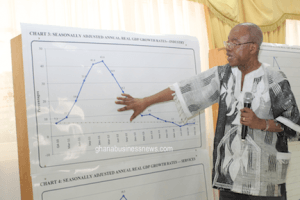Ghana’s economic indicators worse despite oil discovery – CEPA

Ghana’s performance as measured by the key macroeconomic indicators is worse than the pre-oil era, according to the Centre for Policy Analysis (CEPA).
The think tank says the country’s growth performance has been on a downward trend despite two periods of growth spurts leading to the need for an ‘IMF bailout’.
The International Monetary Fund (IMF), on April 3, 2015, approved a $918 million three-year Extended Credit Facility (ECF) for Ghana, but classified the country as “high risk of debt distress” under a new debt sustainability analyses (DSA).
Speaking to journalists at a press briefing after the Greenhill Roundtable for Effective Economic Management and Governance (GREEMG), a three-day workshop organized from June 22 to 24, 2015 under the theme “From home-grown through Senchi to IMF Bail-out’, Prof Joe Abbey, an economist and Executive Director of CEPA said the IMF programme would not necessarily address the downward trend of the economy, but “it is just meant to buy credibility,” he said.
He gave a chronicle of how IMF programmes have in the past saved the local currency, the cedi from decline. This he described as the “IMF effect.”
He indicated that when in 2009, the currency was depreciating; it suddenly recovered when the country signed up to an IMF programme.
Prof. Abbey noted that the cedi stabilized and improved soon after the IMF programme, but depreciated after a while.
Prof. Abbey pointed out that in 2011 when the country started producing oil, that also helped the cedi to gain.
He however, said in 2008 and 2012, which were election years, the economy suffered decline.
According to Prof. Abbey, not even a $1.8 billion cocoa syndication loan could help the economy.
“In 2013 there was a Eurobond of $1 billion, there was another $1 billion in 2014 and $1 billion Eurobond projected for 2015, but these couldn’t save the economy,” he said.
Prof. Abbey said the country is suffering a ‘HIPC Syndrome’. In a press release issued after the briefing CEPA said the workshop focused on the country’s legacy of “supply driven aid and inability to effectively manage our resources which have resulted in an economy that is characterized by high government spending, high fiscal deficit, high external merchandise trade (and current account) deficit, low domestic savings and heavy public (external) debt – which CEPA refers to as the HIPC Syndrome.”
The release noted that the meeting expressed concern about the lack of access to and high cost of credit for SMEs.
“The large size of the fiscal deficit is responsible for the high lending rate charged to the private sector,” the meeting concluded and recommended that better governance structures and improved transparency in the operations and financial transactions of SMEs, for example book keeping, can improve the risk perceptions about them and hence their access to credit.
CEPA also pointed out that, “Monetary policy has been constrained by fiscal excesses. This has also led to high inflation and difficulties in maintaining a stable exchange rate.”
CEPA however believes that the implementation of fiscal consolidation under the current IMF supported programme could help resolve the issue.
By Emmanuel K. Dogbevi
